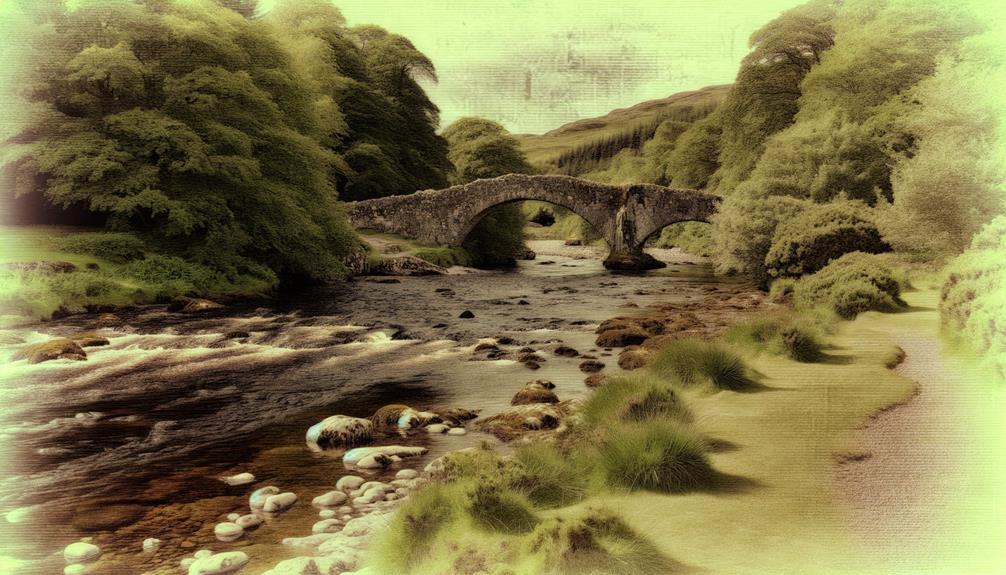Clyde Name Meaning and Origin
The name Clyde originated from the ancient Gaelic 'Cluaidh', referring to the River Clyde in Scotland. This River, integral to Scotland's maritime history, saw its name evolve through Celtic roots and Roman influence, becoming 'Clotae' in Latin.
Clyde echoes Scotland's industrial growth and cultural heritage, particularly during the shipbuilding boom of the 18th to early 20th centuries. Popular in the early 20th century, it represents strength and reliability, traits celebrated in literature, music, and film.
The name maintains a resonance of natural beauty and steadfastness, inviting further exploration of Clyde's historical and cultural significance.

Key Takeaways
- Clyde originates from the River Clyde in Scotland, derived from ancient Gaelic 'Cluaidh'.
- The name Clyde is believed to have indigenous Celtic roots, later Latinized to 'Clotae'.
- Clyde symbolizes strength and reliability, reflecting Scotland's maritime and industrial history.
- The name saw peak popularity in the early 20th century and has modern resurgence.
- Clyde's geographical association conveys natural grandeur and historical significance.
Etymology of Clyde
The etymology of the name Clyde can be traced back to its origins in the ancient Celtic language. It is derived from the river name 'Clota,' which was later Latinized to 'Clotae' and eventually evolved into the modern form. The name 'Clota' itself is believed to be of indigenous Celtic origin, referring to the River Clyde in Scotland, a significant waterway in the region.
Over centuries, linguistic shifts and Roman influence led to the adaptation of 'Clota' to 'Clotae,' demonstrating a common pattern of Latinization of local names. The semantic evolution of Clyde reflects a journey through ancient languages, capturing historical transformations and preserving the heritage of its Celtic roots, embodying both natural and cultural significance.
Historical Significance
Beyond its etymological roots, the name Clyde holds considerable historical significance, particularly in relation to the River Clyde's impact on Scotland's development and culture.
This river, central to Scotland's maritime and industrial prowess, facilitated the thriving shipbuilding industry from the 18th to the early 20th centuries. The name Clyde became synonymous with innovation and economic growth, underscoring its metamorphosis from a simple geographical designation to an emblem of industrial revolution.
Moreover, the River Clyde's role in trade and transportation bolstered Scotland's economy and global connections. Consequently, the name Clyde evolved semantically, embodying resilience and progress.
This historical context enriches the name's meaning, rendering it evocative of a legacy that intertwines with Scotland's rich cultural tapestry.
Geographical Roots
Rooted in the picturesque landscapes of Scotland, the name Clyde originates from the River Clyde, an essential waterway that has shaped the region's history and cultural identity. This river, whose name is derived from the ancient Gaelic 'Cluaidh,' has witnessed the ebb and flow of civilizations, from Celtic tribes to industrial expansions. The significance of the River Clyde in linguistic and semantic contexts cannot be overstated.
- Etymology: Derived from Gaelic 'Cluaidh'
- Historical Importance: Central to Scotland's industrial revolution
- Cultural Influence: Features prominently in Scottish folklore
- Natural Beauty: Scenic landscapes surrounding the river
- Economic Role: Key in trade and shipbuilding
Understanding the geographical roots of Clyde provides a rich tapestry of historical and cultural relevance.
Popularity Over Time
Tracing the popularity of the name Clyde over time reveals a fascinating interplay between cultural trends, historical events, and linguistic shifts. In the early 20th century, Clyde reached its peak in usage, particularly in English-speaking countries, reflecting broader societal preferences for strong, monosyllabic names.
This period saw a rise in the appreciation of Scottish names, correlating with increased immigration and cultural exchange. However, the latter half of the century witnessed a decline, possibly due to evolving naming conventions favoring more contemporary and diverse options.
Despite this, the name retains a nostalgic charm, often evoking images of rugged landscapes and historical significance. Such semantic evolution underscores the dynamic nature of name popularity, influenced by the ebb and flow of societal values.
Cultural References
The name Clyde has permeated various facets of cultural history, from literature and film to music and geographical landmarks, reflecting its enduring resonance across different domains. Its linguistic roots trace back to the River Clyde in Scotland, a significant waterway that has been central to Scottish history and commerce.
Over time, the name Clyde has evolved semantically, often symbolizing strength and reliability.
- Literature: Clyde appears in various novels and stories, often embodying steadfastness.
- Film: The name has been used in character names, enhancing its cultural footprint.
- Music: Songs and albums have been named Clyde, immortalizing it in melodies.
- Geographical landmarks: Numerous places, especially in the United States, are named Clyde.
- Historical references: The name is frequently referenced in historical texts.
This multifaceted use underscores its lasting cultural significance.
Famous People Named Clyde
Renowned individuals named Clyde have left indelible marks across various domains, from sports and politics to arts and sciences, highlighting the name's broad influence and historical significance. From its Scottish linguistic roots, the name Clyde has evolved semantically to symbolize strength and resilience. Historical figures like Clyde Barrow, of the notorious duo Bonnie and Clyde, have etched the name into the annals of American folklore. In the domain of sports, Clyde 'The Glide' Drexler is celebrated for his extraordinary basketball career. Politically, Clyde Cameron played a significant role in Australian labor reforms.
| Field | Notable Figure | Contribution |
|---|---|---|
| Crime | Clyde Barrow | Infamous outlaw |
| Sports | Clyde Drexler | Basketball Hall of Fame inductee |
| Politics | Clyde Cameron | Influential Australian labor reformer |
This diversity underscores the name's impactful legacy.
Variations and Nicknames
Clyde's linguistic journey has given rise to various nicknames and alternative forms, reflecting its cultural adaptability and enduring appeal. Rooted in ancient Celtic origins, the name has evolved through centuries, adapting to different linguistic and regional influences. These variations offer insights into the semantic and phonetic transformations the name has undergone.
- Cly: A shortened, affectionate form commonly used in informal settings.
- Clydie: A diminutive that adds a touch of endearment, often used for younger individuals.
- Clydey: A playful variant that retains the name's core sound while softening its tone.
- Clide: A phonetic variation seen in some dialects and regions.
- Claud: Though less common, this variant reflects historical linguistic shifts.
These variations underscore Clyde's rich etymological heritage and its persistent relevance across different cultures.
Modern Usage
In contemporary contexts, the name Clyde has experienced a revival, largely influenced by its appearances in popular media and literature.
Its historical roots as a river name in Scotland have evolved into a modern identifier, retaining cultural significance while gaining favor among new parents.
Today, Clyde embodies a mix of traditional heritage and contemporary appeal, making it a notable choice in the landscape of baby names.
Popularity in Media
Throughout modern media, the name Clyde has been prominently featured in various films, television shows, and literary works, reflecting its enduring cultural resonance. This name's journey from its historical roots to its current media presence showcases its linguistic versatility and semantic evolution. Clyde's portrayal often embodies strength, loyalty, and an adventurous spirit, characteristics that have solidified its place in popular culture.
- 'Bonnie and Clyde' (1967): A landmark film that immortalized the name in the context of outlaw folklore.
- 'Clyde' the orangutan in the 'Every Which Way But Loose' series: Added a humorous, endearing quality to the name.
- 'Clyde Barrow': A recurring character in various adaptations and literary works.
- 'Clyde' in 'South Park': A modern-day, relatable character.
- Clyde in various comic books: Frequently used to denote strong, reliable characters.
Contemporary Baby Names
Amidst evolving naming trends, the name Clyde has experienced a resurgence in contemporary baby name selections, reflecting a blend of historical reverence and modern appeal.
Rooted in the Gaelic 'Cluaidh,' Clyde historically signifies the river in Scotland. This geographical association imbues the name with a sense of natural grandeur and timelessness.
In recent years, parents have gravitated towards names that embody both a storied past and a distinctive, yet familiar, sound. Clyde fits this criterion, balancing its rich, historical associations with a phonetic simplicity that suits modern sensibilities.
As a result, Clyde stands as a compelling choice for those seeking a name that bridges tradition and contemporary allure, harmonizing linguistic heritage with current naming conventions.
Cultural Significance Today
Today, the name Clyde carries both historical reverence and contemporary relevance, symbolizing a blend of cultural heritage and modern identity. Rooted in the River Clyde in Scotland, the name has evolved semantically to embody qualities of strength and resilience.
- Historical Usage: Popular in the early 20th century, often associated with figures like Clyde Barrow of the infamous duo, Bonnie and Clyde.
- Linguistic Roots: Derived from the Gaelic word 'Cluaidh,' representing the River Clyde.
- Modern Popularity: Experienced a resurgence due to its classic yet timeless appeal.
- Cultural Influence: Frequently found in literature, film, and music, underscoring its enduring charm.
- Symbolic Meaning: Emblematic of natural beauty and steadfastness, resonating with contemporary values.
Through these facets, Clyde remains a name of enduring significance.
Conclusion
The name Clyde, rooted in historical contexts and linguistic origins, has evolved semantically over time. The name Clyde, originally derived from the Gaelic word for “river,” has been associated with various geographic locations and figures throughout history. Its linguistic origins can be traced back to the Old Norse “klútr,” meaning “a wave” or “a bend. ” The name has evolved to encompass connotations of strength, resilience, and fluidity. Similarly, the origin and meaning of the name Cameron can be explored in relation to its historical and linguistic roots.
An interesting statistic highlights its popularity peak in the United States during the 1930s, where it ranked among the top 100 names for boys. This statistical data underscores the name's cultural resonance and historical significance.
The exploration of Clyde's etymology, geographical roots, and cultural references illustrates its enduring legacy and multifaceted nature across different periods and societies.






